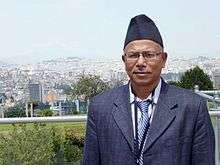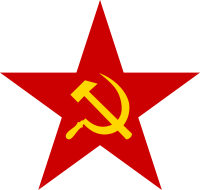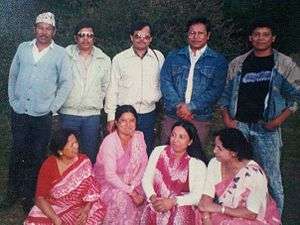Sarbottam Dangol
| Sarbottam Dangol सर्वोत्तम डंगोल | |
|---|---|
 | |
| Born |
Sarbottam Dangol August 30, 1955 |
| Nationality | Nepalese |
| Alma mater | Tribhuvan University (Bachelor of Science, Master of Management) |
| Occupation | Political Bureau Member, Communist Party of Nepal (Maoist-Centre)- |
| Years active | 1980 to present |
| Political party | Communist Party of Nepal (Maoist-Centre) |
| Spouse(s) | Shanta Dangol (m. 1988) |
| Children |
Sarbesh Dangol (b. 1990) Saneera Dangol( b. 1994) |
| Parents |
|
Sarbottam Dangol (Nepal Bhasa: सर्वोत्तम डंगोल) (Born on 30 August 1955 in Kathmandu, Nepal), politically known as 'Kailash' (Nepali: कैलाश) is a prominent Nepalese leader of Unified Communist Party of Nepal (Maoist) (UCPNM) and central committee member of Communist Party of Nepal (Maoist-Centre).[1] He is also a political representative at Kathmandu Metropolitan City office of Nepal.[2]
He stood for the election in 2008 Nepalese constituent Assembly from Kathmandu area no. 8, but was not elected with only 6573 votes (20%), while the winning candidate got 33.5% of the total votes.[3]
He belongs to Newar community of Nepal.[4]
| Part of a series on |
| Communism |
|---|
 |
|
Concepts
|
|
Internationals |
|
Related topics |
|
|
Personal life, Education and Early career
Sarbottam Dangol was born on 30 August 1955 to his father Dwarika Dangol (also a Nepalese communist leader, known as "Kisan neta", Nepal Bhasa: "किसान नेता") and his mother Jambuwati Dangol, as an eighth child in Kathmandu, the capital city of Nepal in a middle-class family. He received a Bachelor of Science and Master of Management from Tribhuvan University, Kathmandu, Nepal.[5] He also worked as a school headmaster[6] till 1985 and worked as a communist political leader of United People's Front of Nepal.
Political career
His active and most important participation in the Nepalese politics was during the late 80s and early 90s, when he worked as a student leader, who threatened the then royal government and resulted in his arrest by the former royal government in May 1985 and was detained for two years without charge or trial, including two months of incommunicado detention. Amnesty International strongly demanded his release to the then royal government after the reports of torture had been revealed.[7] His participation was notably important during the People's movement of anti-monarchy for Republic establishment in 1990 and was imprisoned number of times until the establishment of multi-patry democracy in 1990.[8]
He joined Communist Party of Nepal (Maoist-Centre) in 2007 and currently, he is a political leader, Central Committee member of Communist Party of Nepal (Maoist-Centre) and a political representative at Kathmandu Metropolitan City.[9]
Gallery

References
- ↑ UCPN (Maoist) "General convention concludes" Check
|url=value (help). myrepublica.com. 2013. Retrieved 2013-10-14. - ↑ "The Himalayan Times". thehimalayantimes.com. 2011. Retrieved 2013-10-14.
- ↑ Results of the Nepalese Constituent Assembly election, 2008
- ↑ "Jwajalapa". jwajalapa. 2008. Retrieved 2013-10-14.
- ↑ Dangol, Sarbottam. "Sarbottam Dangol". Sarbottam Dangol. Retrieved 14 October 2013.
- ↑ Dangol, Sarbottam. Sarbottam Dangol. Amnesty International. Retrieved 14 October 2013.
- ↑ Dangol, Sarbottam. The other side. Amnesty International. Retrieved 15 October 2013.
- ↑ Dangol, Sarbottam. "Campaign for the Abolition of Torture. Circular No.68.". Amnesty International. Retrieved 14 October 2013.
- ↑ Dangol, Sarbottam. "Sarbottam Dangol". Sarbottam Dangol. Retrieved 14 October 2013.
